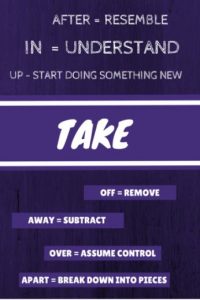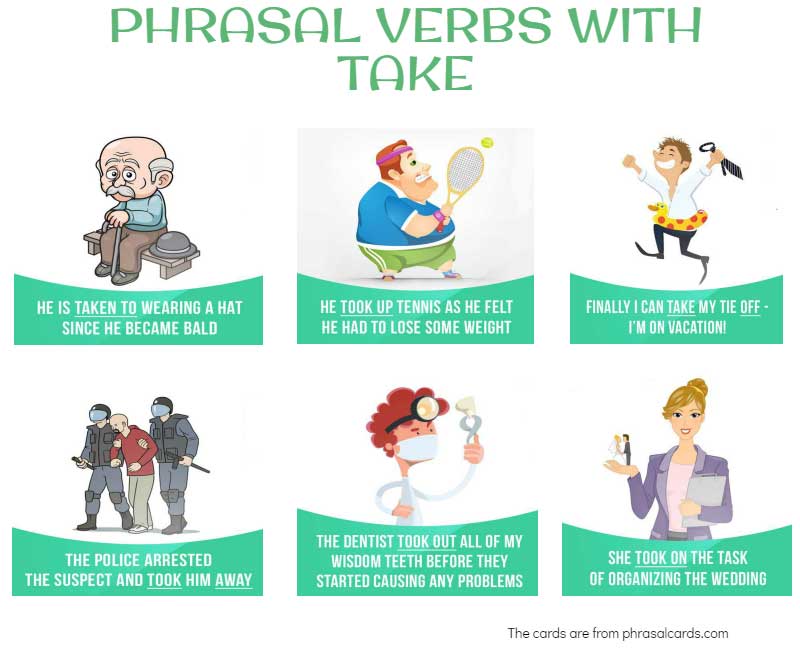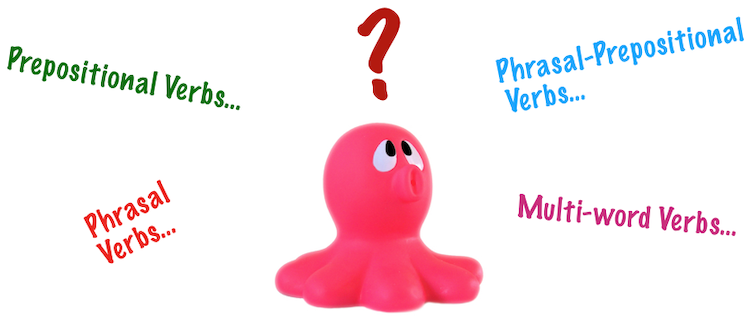Здесь приведены фразовые глаголы английского языка с take. Каждый фразовый глагол имеет перевод, транскрипцию, произношение, а также предложения с примерами использования.

Глагол take часто используется в составе многочисленных фразовых глаголов английского языка.
Основное значение глагола take – брать; хватать.
take [teɪk]
took [tuk]
taken [‘teɪk(ə)n] – брать, взять, снять, принять, приниматься, предпринимать, принимать, воспринимать, занять, занимать.
Take Aback
take aback [teɪk əˈbæk] – захватить врасплох; поразить, изумленность, озадаченность, крайняя степень удивления
Синонимы: stun, smite, strike, shock
Her sudden change of opinion took us all aback. — Мы все были чрезвычайно удивлены, что она так неожиданно сменила свою точку зрения.
Take After
take after [teɪk ˈɑːftə] – походить на (родителей, родственников).
Синонимы: resemble
Emmet is very short – he takes after his uncle. – Эммет очень маленького роста, он пошел в своего дядю.
Take Along
take along [teɪk əˈlɔŋ] – взять с собой, брать с собой
Frequently, a cow, if not a herd of cattle was taken along with the family. — Довольно часто семья брала с собой корову, а то и целое стадо скота
Take Apart
take apart [teɪk əˈpɑːt] – разбирать (на части), демонтировать, разобрать, раскритиковать, наносить поражение
Синонимы: disassemble, dismantle, break down
We have to take apart the whole engine. — Нам придётся разобрать весь мотор.
Tom’s latest book has been taken apart by the newspapers. — Последнюю книгу Тома резко раскритиковали в газетах.
Take Around
take around [teɪk əˈraʊnd] – показать окрестности
My brother takes me around and showed Paris sight. — Мой брат показывает мне Париж и ее достопримечательности.
Take Aside
take aside [teɪk əˈsaɪd] – отвести в сторону, отозвать (для разговора)
Синонимы: revoke, withdraw, recall
He was very much surprised when she took him aside. — Он был очень удивлён, когда она отвела его в сторону.
Take Away
take away [teɪk əˈweɪ] – убирать; уносить, уводить, увозить, удалять, вычитать
Синонимы: remove, withdraw, put away, clean, pick up, select, pick
You may take away. — Можно убирать (со стола).
She took away the toy. — Она унёсла игрушку.
Take Back
take back [teɪk bæk] – отрекаться, отказываться (от сказанного, написанного, предложенного) ; признавать свою неправоту, возвращать (на прежнее место), возвращать (к воспоминаниям), принимать обратно
Синонимы: take away, retract, withdraw, repossess, return
take back one’s unkind / hard words — извиняться за резкость
take smb. back to the time when one was a kid — напоминать (кому-либо) о детстве
Take Down
take down [teɪk daʊn] – сносить, разрушать, разбирать, переносить
Синонимы: demolish, dismantle
The building is to be taken down. — Здание идет на слом.
to take down a machine — демонтировать станок
Take In
take in [teɪk ɪn] – принимать (гостя) ; предоставлять приют, брать (жильцов и т.п.), брать (работу на дом), выписывать (газету, журнал), присоединять (территорию), включать, содержать
Синонимы: catch, soak up, ingest, absorb, take up
to take in a refugee — приютить беженца
to take in washing — брать на дом стирку
to take in a lecture — понять лекцию
Take Off
take off [teɪk ɔf] – снимать, сбрасывать, уменьшиться; прекратиться, ослаблять; отпускать, взлететь
Синонимы: remove, fly, leave the ground
to take off one’s clothes — раздеваться
The wind is taking off. — Ветер стихает.
to take off the brake — отпускать тормоз
Take On
take on [teɪk ɔn] – принимать на службу, брать (работу) ; браться (за дело), иметь успех, становиться популярным
Синонимы: assume, take
to take on extra work — брать (браться за) дополнительную работу
Her theory didn’t take on. — Её теория не имела успеха.
Take Out
take out [teɪk aʊt] – вынимать, удалять, выводить (пятно), выходить, выезжать, пригласить (в театр, ресторан)
Синонимы: remove, pull, get, take, carry
Take out your pens. — Выньте ручки.
to take out a tooth — удалить зуб
He never takes her out. — Он её никогда никуда не приглашает.
Take Over
take over [teɪk ˈəʊvə] – принимать (должность, обязанности) от другого, вступать во владение (вместо другого лица), (take over from) наследовать (кому-л.), перевозить; перевозить на другой берег, соединять (по телефону), провести, одурачить
Синонимы: seize, capture
to take over a business — принимать (на себя) руководство
Let him take over her problems. — Позвольте ему взять её проблемы на себя.
Take Through
take through [teɪk θruː] – осуществить, довести до конца (что-л.), провозить через
Синонимы: bring through
They will take their project through. — Они доведут свой проект до конца.
Take To
take to [teɪk tuː] – завести привычку, пристраститься что-л. делать, привязаться к кому-л.
Синонимы: go for
She took to him immediately — Она сразу привязалась к нему
I don’t know how she’ll take to it — Я не знаю, как ей это понравится
Take Up
take up [teɪk ʌp] – обсуждать (что-л.), снимать, удалять; перемещать, сматывать; свёртывать, укорачивать, убирать
Синонимы: occupy, borrow, bring, borrow, put, serve
to take up paving stones — снять дорожное покрытие
to take up a tree — пересадить дерево
to take up the film — смотать плёнку
to take up a skirt — укоротить юбку
Click the card to flip 👆
Add the second part of the multi-word verb that begins with ‘take’
Other sets by this creator
Verified questions
vocabulary
Verified answer
literature
Verified answer
vocabulary
Verified answer
Other Quizlet sets
Сегодня поговорим о фразовых глаголах (phrasal verbs), в основе которых глагол to take. Напомним, to take – неправильный глагол, формы которого TAKE – TOOK –TAKEN.
Итак, начнем. Далее приведены основные фразовые глаголы с take с переводом и примером употребления в предложении.
Phrasal verbs with to take.
- take aback – сильно удивлять, шокировать, ошеломлять
Their parents were taken aback when Paul and Marry said they were getting married. – Родители были сильно удивлены, когда Пол и Мери сказали, что собираются пожениться.
- take after – быть похожим на
I took after my father. — Я похожа на отца
- take apart — 1) разобрать на части 2) разнести кого-либо в пух и прах
Sam took the computer apart and now he can’t reassemble It. – Сэм разобрал компьютер и сейчас не может собрать его.
The opposition took the politician apart. — Оппозиция разнесла политика в пух и прах.
- take around —показатьдостопримечательности
She took me round and showed me London sights. – Она показала мне достопримечательности Лондона.
- take away — 1) убрать 2 забрать
Mother cleaned the room and took away the dirty dishes. – Мама прибрала комнату и убрала грязную посуду.
Take that away! — Убери это!
- take back — 1) возвращать 2) забирать (свои слова) обратно 3) напоминать прошлое
I took the TV set back to the shop, as it didn’t work. – Я вернул телевизор в магазин, так как он не работал.
Не took back his words because she was upset. Он забрал свои слова обратно, так как она расстроилась.
The smell of cookies took him back to his childhood. Запах печенья напомнил ему о детстве.
- take for — принимать одно за другое
I took you for your brother. — Я принял вас за вашего брата.
- to take off — 1) снимать (обувь, одежду), 2 взлетать
I took off my shoes – Я сняла туфли
I hate taking off. – Терпеть не могу взлетать.
- to take on — 1) принять (поступить) на работу, 2) брать на себя
The company needs to take on a couple of people. – Компании нужно взять на работу несколько человек.
We’ve taken on too much work. — Мы взяли на себя слишком много работы.
- to take out — 1) вынимать / снимать с карточки, 2) приглашать в ресторан / кино / погулять
She took out $100. – Она сняла с карточки $100.
Greg took me out on Friday night to a nice restaurant. – В пятницу вечером Грег повел меня в замечательный ресторан.
- take through – подробно объяснять
He took me through the registration process and explained it all. — Он подробно описал мне регистрационный процесс и все объяснил.
- take to — 1) пристраститься / увлечься
He took to swimming — он увлекся плаваньем.
- take up — 1) заняться чем-либо 2) занимать (отнимать) 3) поднимать, нести наверх
He’s taken up golf. – Он занялся гольфом.
This sofa takes up too much space. Этот диван занимает слишком много места.
Также следует запомнить выражения:
- take for granted – принимать как должное
- take up with someone — подружиться, связаться с кем-либо
Упражнения.
А теперь давайте выполним несколько упражнений на употребление фразового глагола to take.
Упражнение 1. Заполните пропуск предлогом.
- Please take your hat ___ when you go inside a building.
- Both my sister and I take ___ our father
- He took the car brakes ____ and found the problem.
- My grandparents took us … for dinner and a movie.
- I have taken … going for a five-mile run every morning.
- Studying takes… most of my time.
- Sophie has just been taken … with a permanent contract.
- She had to take everything… of her handbag before she found her papers.
- We were all taken … by the news.
Упражнение 2. Выберите правильный вариант ответа
- Не looks like his mother — he takes after / to / for her.
- Do you take me after / in / for an idiot?
- The plane could not take off / up / to because of the snow.
- He took after / up / in swimming when his doctor told him he needed to more exercises.
- The company took in / up / on several new employees to cope with the extra demand.
- He took up / down / on everything the lecturer said in his notebook.
- She took down / to / in drinking after her husband died.
- I took my hat off / on / out when I entered the building.
- If you don’t take your books out / back / into to the library on time, you have to pay a fine.
- He refused to take what he had said in / back / into even though he knew he was wrong.
- I couldn’t put the radio back together after I had taken it off / out on / apart.
Ответы:
Упражнение 1.
1 off, 2 after, 3 apart, 4 out, 5 up (to), 6 up, 7 on, 8 out, 9 aback
Упражнение 2.
1 after, 2 for, 3 off, 4 up, 5 on, 6 down, 7 to, 8 off, 9 back, 10 back, 11 apart
Понравилось? Сохраните на будущее и поделитесь с друзьями!
- Home
- Types of Verbs
- Multi-word Verbs
Multi-word verbs are verbs that consist of more than one word. They fall into three types:
- prepositional verbs
- phrasal verbs
- phrasal-prepositional verbs
Before we look at each one, we’ll examine more generally what multi-word verbs are.
What are Multi-word Verbs?
Multi-word verbs are made up of a verb and a particle. Particles are words that we use as prepositions and / or adverbs in other contexts. Here are examples of some of these words:
Verbs
- give
- come
- look
- take
- bring
- put
- made
Particles (Prepositions and Adverbs)
- into
- on
- away
- over
- to
- up
- out
When we combine a verb with a particle to make a multi-word verb, it has a different meaning to the meaning of those words when used on their own.
For instance, here are two common meanings of one word taken from each list:
- give = transfer the possession of something to someone else e.g. I gave him my passport.
- up = towards a higher place or position e.g. he went up the stairs
However, we can put these two words together to make a multi-verb word, creating a completely different meaning:
- He wants to give up smoking = stop
So give up is a multi-verb word we have created by placing together a verb and a particle. Neither give nor up have the same meaning as when they are used on their own.
Where do they come in sentences?
Multi-word verbs are no different to other verbs in that they can be used as a main verb (i.e. after a subject and taking a tense) or in other positions, such as acting as an infinitive:
- Main Verb: He gave up smoking last week (used after a subject and in the past tense)
- Infinitive: It is important to give up smoking (base form of the verb used after an adjective)
Some multi-word verbs can be split up, while others cannot:
- Cannot be separated: She looks after the children on Saturdays
- Can be separated: He looked up the word in the dictionary / He looked the word up in the dictionary
Multi-verb words as idiomatic expressions
Given that multi-word verbs have different meanings to the individual words, they tend to be idiomatic expressions.
Some will make sense as you see them but others may look confusing if you are not already aware of what they mean.
For example, in the first two, we can probably guess the meaning, but the others are more difficult:
- The plane took off at 5pm (= became airborne)
- He got up early this morning (= rise to a standing position)
- She put him up for the week (= provided temporary accommodation)
- She let him off (=forgave)
So with these types of verbs you often have to learn them and their meanings as it can be difficult to guess the meanings from context.
Types of Multi-word Verbs
There are three types of multi-word verbs:
- prepositional verbs
- phrasal verbs
- phrasal-prepositional verbs
1. Prepositional Verbs
A prepositional verb is a multi-word verb made up of a verb plus a preposition. These are the key factors which make these multi-word verb prepositional verbs:
- They must have a direct object
- They are transitive (because they have a direct object)
- The main verb and preposition are inseparable (i.e. the object must go after the preposition)
Structure of Prepositional Verbs
Main Verb + Preposition + Direct Object
Here are some examples of prepositional verbs:
Prepositional Verb Examples
- I sailed through my speaking test
- Their house was broken into
- He can’t do without his car
- She really gets into her music
- I will deal with the problems
- I looked after her cat
In none of these cases can we move the direct object to between the verb and particle, or in other words separate them. For instance we can’t say I sailed my speaking test through or He can’t do his car without.
You may have thought that Their house was broken into does not fit because there appears to be no direct object after ‘into’.
But remember that as prepositional verbs are transitive, they can usually be turned into the passive voice. This example has been turned from active to passive:
- The burglars broke into their house (active)
- Their house was broken into (passive)
2. Phrasal Verbs
A phrasal verb is a multi-word verb made up of a verb plus an adverb. There are two types of phrasal verb:
- Type 1: No object (intransitive) i.e. they don’t take an object
- Type 2: Object (transitive) separable i.e. they need an object and this can go between the verb and particle
Structure of Phrasal Verbs
Type 1
Main Verb + Adverb
Type 2
Main Verb + Direct Object + Adverb
or
Main Verb + Adverb + Direct Object
Some of the most common adverb particles used with Phrasal Verbs are: around, at, away, down, in, off, on, out, over, round, up.
Phrasal Verb Examples
Type 1:
- The plane took off late
- She got up before him
- The film came out in 1979
- I can’t make out what she is saying
- The meeting went on for several hours
Type 2:
- I can put up your friend for the weekend
- I can put your friend up for the weekend
- She brought up many issues at the meeting
- She brought many issues up at the meeting
Phrasal Verbs and Pronouns
Something to note with Phrasal Verbs in type 2 constructions is that if the object is a pronoun, then it must go between the verb and adverb particle. It cannot go after it.
So it has to be like this:
- I can put him up for the weekend
- She brought it up at the meeting
2. Phrasal-Prepositional Verbs
The key distinguishing factors of these types of multi-word verbs are:
- They take an object (so are transitive)
- They have two particles
- The particles are inseparable
Structure of Phrasal-Prepositional Verbs
Main Verb + Particle + Particle
Phrasal-Prepositional Verb Examples
- I look up to my uncle
- You must get on with your work
- He couldn’t face up to his problems
- I always look out for her
- Let’s catch up with John next week
- I always look forward to seeing her
It is possible though with certain phrases to put a direct object after the verb. So in this case there will be a direct object and object of the preposition:
Examples with Verb + Object
- She fixed me up with her freind
- I let Jane in on the secret
- He put me up to it
- I put the problem down to them
Some difficulties for learners
Understanding what multi-word verbs mean
Some learners of English find multi-word verbs difficult because they may take the literal meanings of the individual words. For example, with this sentence:
- I was looking forward to seeing her
It actually means to await eagerly, in this case to meet someone at a later date, but taken literally a person could think it means looking in a particular direction, such as looking ahead at someone.
Misunderstanding Multi-word verbs with two meanings
Some verbs can have two meanings, which confuses some people if they only know one. For example:
- I dropped her off at school (= give someone a lift somewhere)
- I dropped off several times during the class (= falling asleep unintentionally)
Only noticing the verb if separated from the particle
If as a learner, you only notice the verb, then this can make you misunderstand the sentence and again take the verb with it’s literal meaning. This can often happen when they are split up with several words between them:
- He put all of the problems that we have been having down to the hot weather
In such a case the phrasal verb may not be recognised.
Understanding the difference between Phrasal Verbs and Prepositional Verbs
This can be unclear; however, it is not really important to know the differences. As long as you understand that multi-word verbs are verbs plus a preposition or adverb (or both) and that they have a differing meaning to the words on their own, that is enough for most purposes.
But the key difference is that an object can go before or after an adverb, but it can only go after a preposition. In other words:
- Prepositional verbs must not be seperated
- Phrasal Verbs can be separated
Of course type 1 Phrasal Verbs would not be separated because they do not have an object at all.
Incorrect Word order
It is often the case that a speaker or writer may get the the word order of the multi-word verb wrong, with the pronoun placed in the wrong place:
- I don’t have the space to put up him (should be put him up)
Differing grammatical explanations
It can sometimes be confusing when you search on ‘multi-word verbs’ or ‘Phrasal Verbs’ as differing sites or books categorise them differently.
For instance, in some cases, all verbs + preposition or / and adverbs are labelled as multi-word verbs, regardless of whether they create a different meaning. For instance:
- He went into the room
- They are waiting for her
- He is suffering from heatstroke
- I agree with you
In these cases, the phrases have their literal meaning and have not been changed. However, these could be seen simply as words that commonly collate together rather than multi-word verbs.
In some cases, all those that have a different meaning are labelled ‘Phrasal Verbs’, with no reference to prepositional verbs.
This should not really concern you though. The main thing to know is the differing structures with regards to whether words can be separated or not and to understand that with multi-word verbs with different meanings (i.e. what some people just call phrasal verbs) you will probably have to gradually learn there differing meanings.
Here you can find a useful phrasal verb list with examples to start leaning some of the words.
Summary
- Multi-word verbs are a verb plus one or two particles
- It is a word combination that changes the meaning from the individual words
- Prepositional verbs must not be seperated
- Phrasal Verbs can be separated
- They are sometimes all simply known as Phrasal Verbs
New! Comments
Any questions or comments about the grammar discussed on this page?
Post your comment here.
Use Phrasal Verbs such as TAKE as much as possible. Native English speakers typically use plenty of Phrasal Verbs in everyday conversational English. This is just a short list of Phrasal Verbs with TAKE – there are many more.

to take up – to start learning or doing something new. She took up dancing when she was just 3 years old.
to take away – to subtract. What number do you get if you take away 3 from 5? The answer is 2.
to take over – assume absolute control over something. Facebook has taken over as the most important social media site in the world.
to take something back – to return. I didn’t like the colour of that dress so I took it back to the shop.
to take off (1) – to remove. You must take off your makeup at bedtime.
to take off (2) – to leave / depart. The plane was delayed. It was scheduled to leave at 5p.m. but didn’t take off until 5.30p.m.
to take something apart – to break down into pieces. After you use the food processer, you must take it apart to clean it.
Click here for exercises with TAKE as a Phrasal Verb
More Ways to Use TAKE as a Phrasal Verb
to take after somebody – to resemble. She really takes after her father. Not only does she look like him, but her character is also very similar to his.
to take something in – to understand or comprehend. It came as a such a shock when the stock market crashed that he couldn’t quite take in the fact that he’d lost all his money.
to take on – assume responsibility for something. He didn’t want to take on the responsibility of being the chairman of the committee.
Why not create you own Phrasal Verb list with an online tool. Another trick to help you remember phrasal verbs is to try and write your own sentences. If you personalise them, you are more likely to remember them.
More Multi-Word Verbs: LOOK, COME, GO, MEET, GET, PHRASAL VERBS WITH BACK.




